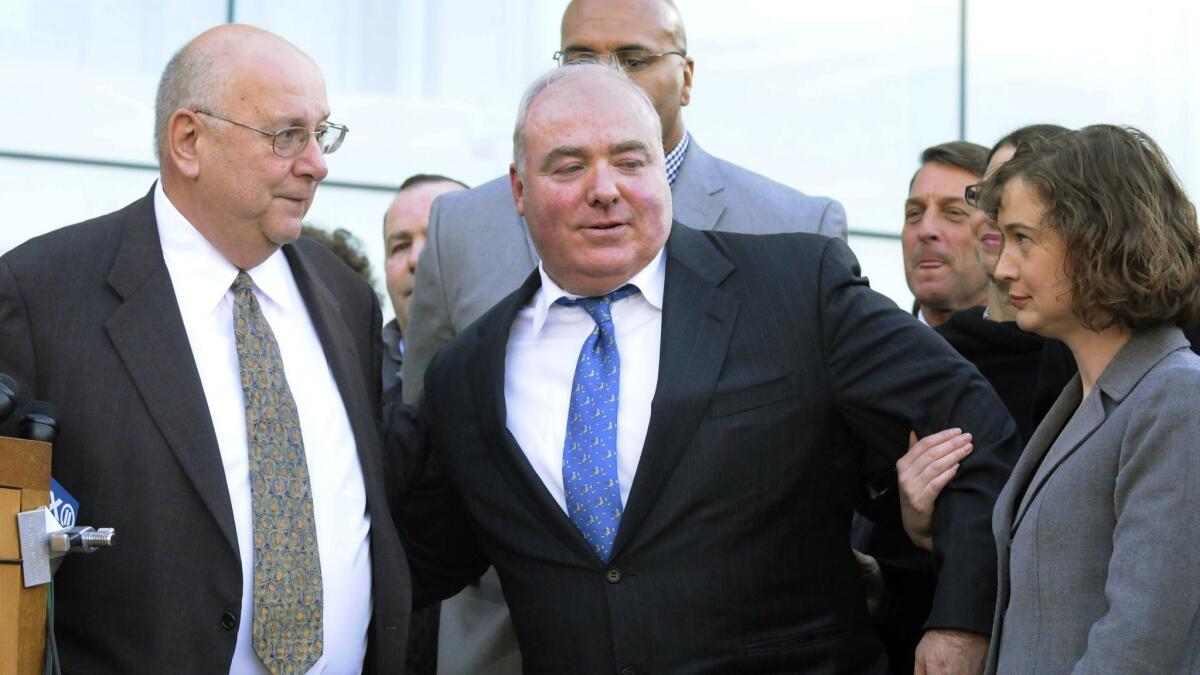Connecticut high court vacates Kennedy cousin Michael Skakel’s murder conviction

- Share via
Reporting from HARTFORD, Conn. — In a stunning reversal, the Connecticut Supreme Court has overturned Kennedy cousin Michael Skakel’s murder conviction in the 1975 bludgeoning death of a girl in wealthy Greenwich, Conn.
The high court issued a 4-3 ruling on Friday that Skakel’s trial attorney failed to present evidence of an alibi. The same court in December 2016 had reinstated Skakel’s conviction after a lower court ordered a new trial, citing mistakes by the trial attorney, Mickey Sherman.
It wasn’t immediately clear if prosecutors will subject Skakel to a new trial. A spokesman for Chief State’s Atty. Kevin Kane said prosecutors were reviewing the new ruling. He declined to comment further.
Skakel, a nephew of Robert F. Kennedy’s widow, Ethel Kennedy, was convicted of murder in 2002 in the death of Martha Moxley in 1975 when they were both teenagers. He was sentenced to 20 years to life in prison, but was freed on $1.2 million bail after serving 11 years when the lower court overturned his murder conviction in 2013.
The case has drawn international attention because of the Kennedy name, Skakel’s rich family, numerous theories about who killed Moxley and the brutal way in which she died. Several other people, including Skakel’s brother Tommy Skakel, have been mentioned as possible killers.
The slaying took place in the exclusive Bell Haven section of Greenwich, where Martha and Skakel were neighbors. At trial, prosecutors said Skakel was angry with Martha because she had spurned his advances while having a sexual liaison with his brother Tommy.
Skakel’s appellate lawyer, Hubert Santos, had asked the Supreme Court to reconsider its 2016 ruling, resulting in Friday’s decision.
“We’re elated that our argument was vindicated,” Santos said Friday. “It was a good decision because it was spot on the law.”
Santos argued that Sherman made poor decisions, including not focusing on Skakel’s brother as a possible suspect and failing to attempt to contact an alibi witness. Santos said Skakel was several miles away from the crime scene on Oct. 30, 1975, watching a Monty Python movie with friends when Moxley was bludgeoned with a golf club.
Santos also has said there was no physical evidence or eyewitnesses linking Skakel to the killing.
Sherman has defended his work, and state prosecutors have argued he did an adequate job. The Associated Press left a message with him Friday seeking comment on the ruling.
The high court’s reversal of a previous ruling is highly unusual, legal observers said.
Moxley’s brother, John Moxley, told the AP that he was disappointed with the ruling and that it was too soon to say what the family would prefer to happen next in the case.
“I don’t know what the next steps are. My mom is getting older. I just don’t think she has the strength to go on with this,” said Moxley, 59.
He said he would not trade places with Skakel for anything.
“He’ll be in jail for the rest of his life,” Moxley said. “He may not be physically in jail. He may be walking the streets, but he’ll be in hell at some point.”
More to Read
Sign up for Essential California
The most important California stories and recommendations in your inbox every morning.
You may occasionally receive promotional content from the Los Angeles Times.










